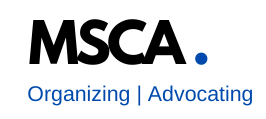Governor’s FY2019 Higher Ed budget: MTA analysis
Please see the MTA analysis of the Higher Ed FY 2019 budget below.
An analysis of the entire Ed budget may be found here.
Higher Education
Taking estimated tuition remission into account, the governor’s budget includes a 0.5 percent average increase for higher education operating budgets over FY18, including a 1 percent increase to UMass and a 1 percent increase to state universities. Community college funding was cut by 0.1 percent, or $275,000.
Funding for the MassGrant program was increased by $7.7 million (8%).
Underfunding of public higher education is a perennial issue in the Commonwealth. To try to alleviate both the issue of campus funding (including benefits available to employees) and high student debt, MTA supports H.639, An Act investing in public higher education and the Fair Share Amendment.
Collective Bargaining Reserve
The governor’s budget also includes a $107 million collective bargaining reserve. At the time this analysis was written, the intended distribution of these funds is unclear.
Tuition Retention Study Commission
The governor’s budget calls for the creation of a study commission to investigate the feasibility of implementing in-state tuition retention at state colleges and universities and community colleges. UMass currently has an in-state tuition retention policy. The commission’s charge is to analyze the cost/benefit of such a program; how to handle tuition waivers mandated by statute; a method for determining cost allocations; and a revenue-neutral implementation plan. No educator voice is included on the commission.
Employee Benefits
Group Insurance Commission Funding
Funding for the Group Insurance Commission premium plan and costs account was decreased by $37.1 million. Budget documents released by the administration indicated that this funding was decreased to “meet projected need.” It is unclear if the GIC’s recent procurement decision is reflected in the number.
Premium Contribution Split
The governor’s budget did not seek to change premium splits for active or retired state employees as he has tried unsuccessfully to do in past years. This may be a result of GIC’s intention to shift additional costs to GIC members through plan design changes such as increased out-of-pocket costs (co-pays and deductibles), effective July 1, 2018.
Sick Leave Accrual
The governor’s budget includes language similar to a bill he filed last session, which would cap the accrual of sick leave for employees. Under the plan, accrued sick time would be capped at 1,000 hours, or six months of work, for all state employees. Current employees who have already accrued over 1,000 hours of sick leave will be able to retain their accrued hours but will be prohibited from accruing additional time until they have dropped below 1,000 hours. This proposal appeared in last year’s budget; however, this year higher education employees are specifically mentioned.
